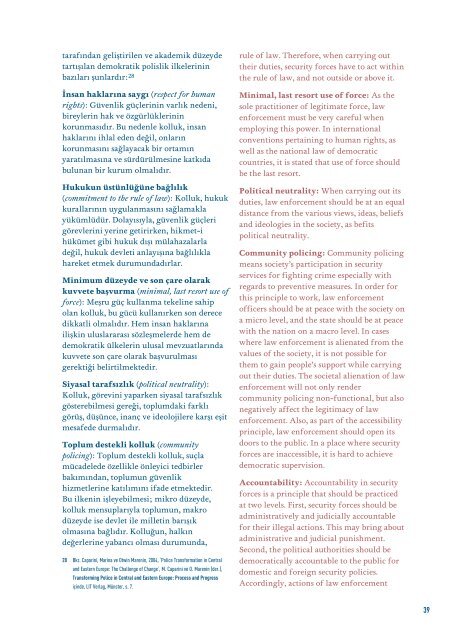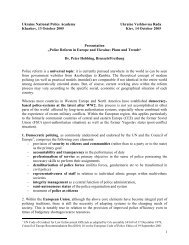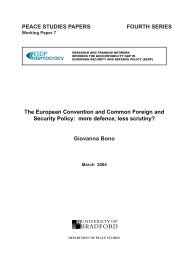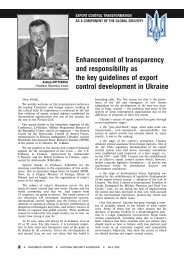Security Sector Governance: Turkey and Europe - DCAF
Security Sector Governance: Turkey and Europe - DCAF
Security Sector Governance: Turkey and Europe - DCAF
Create successful ePaper yourself
Turn your PDF publications into a flip-book with our unique Google optimized e-Paper software.
taraf›ndan gelifltirilen ve akademik düzeyde<br />
tart›fl›lan demokratik polislik ilkelerinin<br />
baz›lar› flunlard›r: 28<br />
‹nsan haklar›na sayg› (respect for human<br />
rights): Güvenlik güçlerinin varl›k nedeni,<br />
bireylerin hak ve özgürlüklerinin<br />
korunmas›d›r. Bu nedenle kolluk, insan<br />
haklar›n› ihlal eden de¤il, onlar›n<br />
korunmas›n› sa¤layacak bir ortam›n<br />
yarat›lmas›na ve sürdürülmesine katk›da<br />
bulunan bir kurum olmal›d›r.<br />
Hukukun üstünlü¤üne ba¤l›l›k<br />
(commitment to the rule of law): Kolluk, hukuk<br />
kurallar›n›n uygulanmas›n› sa¤lamakla<br />
yükümlüdür. Dolay›s›yla, güvenlik güçleri<br />
görevlerini yerine getirirken, hikmet-i<br />
hükümet gibi hukuk d›fl› mülahazalarla<br />
de¤il, hukuk devleti anlay›fl›na ba¤l›l›kla<br />
hareket etmek durumundad›rlar.<br />
Minimum düzeyde ve son çare olarak<br />
kuvvete baflvurma (minimal, last resort use of<br />
force): Meflru güç kullanma tekeline sahip<br />
olan kolluk, bu gücü kullan›rken son derece<br />
dikkatli olmal›d›r. Hem insan haklar›na<br />
iliflkin uluslararas› sözleflmelerde hem de<br />
demokratik ülkelerin ulusal mevzuatlar›nda<br />
kuvvete son çare olarak baflvurulmas›<br />
gerekti¤i belirtilmektedir.<br />
Siyasal tarafs›zl›k (political neutrality):<br />
Kolluk, görevini yaparken siyasal tarafs›zl›k<br />
gösterebilmesi gere¤i, toplumdaki farkl›<br />
görüfl, düflünce, inanç ve ideolojilere karfl› eflit<br />
mesafede durmal›d›r.<br />
Toplum destekli kolluk (community<br />
policing): Toplum destekli kolluk, suçla<br />
mücadelede özellikle önleyici tedbirler<br />
bak›m›ndan, toplumun güvenlik<br />
hizmetlerine kat›l›m›n› ifade etmektedir.<br />
Bu ilkenin iflleyebilmesi; mikro düzeyde,<br />
kolluk mensuplar›yla toplumun, makro<br />
düzeyde ise devlet ile milletin bar›fl›k<br />
olmas›na ba¤l›d›r. Kollu¤un, halk›n<br />
de¤erlerine yabanc› olmas› durumunda,<br />
28 Bkz. Caparini, Marina ve Otwin Marenin, 2004, ‘Police Transformation in Central<br />
<strong>and</strong> Eastern <strong>Europe</strong>: The Challenge of Change’, M. Caparini ve O. Marenin (der.),<br />
Transforming Police in Central <strong>and</strong> Eastern <strong>Europe</strong>: Process <strong>and</strong> Progress<br />
içinde, LIT Verlag, Münster, s. 7.<br />
rule of law. Therefore, when carrying out<br />
their duties, security forces have to act within<br />
the rule of law, <strong>and</strong> not outside or above it.<br />
Minimal, last resort use of force: As the<br />
sole practitioner of legitimate force, law<br />
enforcement must be very careful when<br />
employing this power. In international<br />
conventions pertaining to human rights, as<br />
well as the national law of democratic<br />
countries, it is stated that use of force should<br />
be the last resort.<br />
Political neutrality: When carrying out its<br />
duties, law enforcement should be at an equal<br />
distance from the various views, ideas, beliefs<br />
<strong>and</strong> ideologies in the society, as befits<br />
political neutrality.<br />
Community policing: Community policing<br />
means society’s participation in security<br />
services for fighting crime especially with<br />
regards to preventive measures. In order for<br />
this principle to work, law enforcement<br />
officers should be at peace with the society on<br />
a micro level, <strong>and</strong> the state should be at peace<br />
with the nation on a macro level. In cases<br />
where law enforcement is alienated from the<br />
values of the society, it is not possible for<br />
them to gain people’s support while carrying<br />
out their duties. The societal alienation of law<br />
enforcement will not only render<br />
community policing non-functional, but also<br />
negatively affect the legitimacy of law<br />
enforcement. Also, as part of the accessibility<br />
principle, law enforcement should open its<br />
doors to the public. In a place where security<br />
forces are inaccessible, it is hard to achieve<br />
democratic supervision.<br />
Accountability: Accountability in security<br />
forces is a principle that should be practiced<br />
at two levels. First, security forces should be<br />
administratively <strong>and</strong> judicially accountable<br />
for their illegal actions. This may bring about<br />
administrative <strong>and</strong> judicial punishment.<br />
Second, the political authorities should be<br />
democratically accountable to the public for<br />
domestic <strong>and</strong> foreign security policies.<br />
Accordingly, actions of law enforcement<br />
39

















